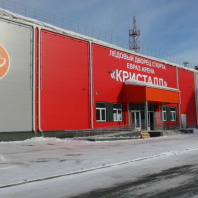ВС РФ с точки зрения USA Today...
 u_96 — 29.04.2014
u_96 — 29.04.2014
Russia's Ukraine actions highlight its military limits
WASHINGTON — Russia's successful annexation of Crimea and destabilizing efforts on Ukraine's eastern border suggest the country's military has made some improvements, but the operations haven't really tested Russia's armed forces because they face a weak foe close to home.
"You don't have to be good to win — just better than your foe," said James Howcroft, a retired Marine intelligence officer with experience in the region.
Russia's military declined sharply after the collapse of the Soviet Union. Starved for resources, it became an army of underpaid conscripts led by corrupt officers. Its conflicts with Georgia in 2008 and Chechnya, beginning in the 1990s, further highlighted a need for change.
"When I think of the Russian military, I think corrupt, conscripted and decrepit," said Loren Thompson, an analyst with the Lexington Institute, a think-tank.
Russia has made some headway in changing its military, modernizing weapons and building a smaller, more agile force. It has also reduced its reliance on conscripts.
"Military reforms have been going on for 23 years in fits and starts," said Olga Oliker, an analyst at Rand.
Russia has had limited success in overhauling its military, largely because it lacks the resources and sometimes the political will.
"The modernization has been slow," said Kevin Ryan, a retired Army brigadier general at Harvard's Belfer Center for Science and International Affairs.
In the 1990s, the size of the armed forces was slashed to about 1 million troops from more than 4.5 million, according to a report by Jonas Grätz, a researcher at the Zurich-based Center for Security Studies. The size of the full-time force is more than 700,000.
About half remain conscripts, though commanders intend to reduce that percentage.
With a smaller military, commanders can boost pay and improve training for troops. Russia has increased its defense budget in recent years and tried to modernize its weaponry.
Russia proved successful at deploying elite special forces troops into Crimea, helping to support and organize pro-Russian militias, which helped drive out Ukraine's fledgling military.
Ryan said the tactic was similar to what the United States did in Afghanistan in 2001 when it used small teams of Special Forces to support anti-Taliban militias, called the Northern Alliance, and overthrow the regime.
Analysts point out that these tactics are not new and don't test Russian technology or command and control capabilities.
"We have never doubted their ability to do the asymmetric missions we have seen them do so well these past couple months," Howcroft said in an e-mail.
Crimea was an operation on Russia's border that didn't require a distant deployment of troops or long communication and supply lines operating amid a hostile population.
"The Russians were capable of confronting an inferior force that is right next door," Thompson said.
The situation didn't test critical weaknesses highlighted in Russia's conflict against Georgia, including the need to modernize its command and control capabilities, Oliker said. Russia's individual services are reluctant to share information instantaneously, a critical requirement on the battlefield.
"It's an impressive operation, but it's an 80% political operation," Oliker said. "The military are there to stand around and look menacing. It's not as if they took Crimea."
Russia's move to deploy 40,000 troops along Ukraine's eastern border, helping to foster unrest in the region, similarly hasn't proved Russia has enhanced its military capabilities.
Analysts say the deployment is made up of Russia's best conventional forces, capable of sustained operations away from their bases.
The operations in Crimea and along the border have probably used up much of Russia's best forces, both from its conventional ranks and special forces, highlighting the limits of Russia's military reach.
"We should not extrapolate from this to think Russia is capable of extending into Poland and Hungary," Ryan said. "They are geographically restricted."
http://www.usatoday.com/story/news/world/2014/04/28/russia-putin-crimea-ukraine/8428309/
Краткое содержание для не владеющих аглицким: "Иваны армию модернизируют, модернизируют, да всё никак не вымодернизируют. Так что армия у них - отстой, но Крым показал, что хуй знает так ли это".
|
|
</> |

 1xBet casino: огромный выбор лицензионных игр, регулярные бонусы и надежная защита данных
1xBet casino: огромный выбор лицензионных игр, регулярные бонусы и надежная защита данных  Так надоел!
Так надоел!  Две новости
Две новости  Случайное фото
Случайное фото  Про одно печальное историческое событие с одной прибалтийской республикой
Про одно печальное историческое событие с одной прибалтийской республикой  Открыт современный Ледовый дворец спорта вместимостью 400 человек в Качканаре
Открыт современный Ледовый дворец спорта вместимостью 400 человек в Качканаре  Семён Михалыч...
Семён Михалыч...  Как Уральская сталь наращивает свою мощь
Как Уральская сталь наращивает свою мощь  Из письма философа И.А. ИЛЬИНА к писателю И.С. ШМЕЛЁВУ. 13 октября 1938 г.
Из письма философа И.А. ИЛЬИНА к писателю И.С. ШМЕЛЁВУ. 13 октября 1938 г. 



